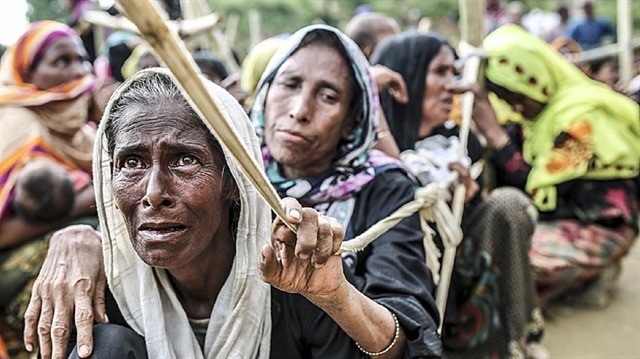
Mehmet Öztürk says it is vital to understand ethno-religious dimension and historical context of conflict
It would be a mistake to analyze the ongoing conflict in Myanmar involving the Rohingya by assuming it is purely due to religious differences, an Ankara-based analyst on Asia said Wednesday.
Mehmet Ozturk, who is Anadolu Agency’s editor-in-chief of Foreign Languages News Desk, said it was vital to understand the history of hostility behind the conflict and the ethno-religious dimension.
Since Aug. 25, more than 436,000 Rohingya have crossed from Myanmar's western state of Rakhine into Bangladesh, according to the UN.
The refugees are fleeing a military operation in which Myanmar’s armed forces and Buddhist mobs have killed men, women and children, looted homes and torched Rohingya villages. According to Bangladeshi Foreign Minister Abul Hasan Mahmood Ali, around 3,000 Rohingya have been killed in the crackdown.
In an interview, Ozturk said: “It is a mistake to consider the question [the conflict in Myanmar] as a religious one. Because there is no massacre completely driven by religious motives.”
He pointed out that some religious groups were being used as tools in the conflict.
Referring to nationalist Buddhist monk Ashin Wirathu who heads the anti-Muslim movement in Myanmar, he said the monk does not represent all Buddhists just like the al-Qaeda founder Osama bin Laden and Daesh chief Abu Bakr al-Baghdadi do not represent all Muslims.
“At the heart of the matter is how should one tackle extremists, in Myanmar’s case, the Buddhists,” he said.
The UN has described the Rohingya as the world's most persecuted people, who have faced heightened fears of attack since dozens were killed in communal violence in 2012.
Last October, following attacks on border posts in Rakhine's Maungdaw district, security forces launched a five-month crackdown in which, according to Rohingya groups, hundreds were killed.
The UN documented mass gang rapes, killings -- including of infants and young children -- brutal beatings, and disappearances committed by security personnel. In a report, UN investigators said such violations may have constituted crimes against humanity.
The European Rohingya Council spokeswoman Anita Schug once described atrocities as a “slow-burning genocide”.
Ozturk said the historical animosity of the conflict in present-day Myanmar dates back to 1784, when the then Burmese King Bodawpaya invaded Arakan (known as Rakhine today) and forced the Rohingya to flee to Bengal region.
“They were not considered as Burmese and instead were seen as Bengali refugees. They have not been not granted citizenship [by Myanmar], and they have no access to education and right to travel around even since then,” he said.
“Neighboring and Muslim countries should continue piling diplomatic pressure on the Myanmar government to stop atrocities against Muslims.”
On the other hand, he said, the problem in Myanmar has to be resolved from within the country, adding the Rohingya refugees seeking safe haven should be able to return to their homes once the issue gets resolved.
Ozturk called for multi-dimensional cooperation, including the UN and international community to do more to resolve the conflict.
Turkey has been at the forefront of providing aid to Rohingya refugees, with President Recep Tayyip Erdogan being among the first and foremost leaders to highlight the persecution of innocent people in Myanmar at several platforms, including recently at the UN.



